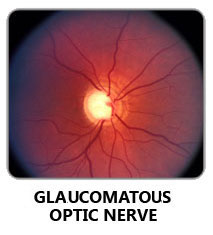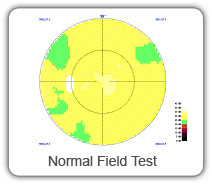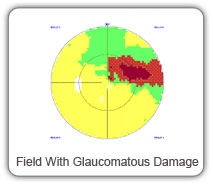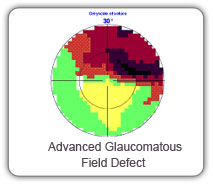Glaucoma
- Services
- Glaucoma
Facility – Glaucoma
- Computerized-Perimeter (Visual Field Analysis)
- Glaucoma Laser
- Pachymeter to measure the central corneal thickness
- Goldman Applanation Tonometer
- OCT ( Optical Coherence Tomography )
- What is Glaucoma?
- Why should I know about Glaucoma?
Glaucoma is a group of diseases of the eye that gradually steals sight without warning and usually without any symptoms (SILENT THIEF OF SIGHT). It is characterized by progressive optic nerve damage, due to various causes. One of them is raised eye pressure called intra-ocular pressure. It causes damage to the nerves that connects the eye to the brain like connecting the telephone to the exchange. If damaged, there is no communication and therefore no eyesight.
Glaucoma a preventable cause of blindness, and second to cataract as a leading cause of blindness in the world. Due to lack of awareness, this disease is not diagnosed in time.
Generally, Glaucoma is not associated with any clear symptoms like pain or vision loss until the disease is in very advanced stage. Glaucoma can be only diagnosed with the help of special tests by an Ophthalmologist. Therefore, early detection and treatment will give you the best possibility of retaining your sight.
I can see very well so surely, I cannot have Glaucoma?
Glaucoma often goes unrecognized until significant permanent damage and some loss of sight has occurred. The damage from glaucoma is permanent. The sight lost cannot be restored. In the early stages, GLAUCOMA HAS NO SYMPTOMS of the loss of vision.
The risk factors to develop Glaucoma include:- Persons over the age of 40 years
- A family history, relatives of glaucoma patients
- Short-sightedness (Myopia)
- People with diabetes
- Trauma to the eye
- Wide range of other eye diseases and various eye drops
- It is present in 2% of the population over 40 years of age and this factor increases with the age. Up to 10% of people over 70 years of age have Glaucoma. Yet, Glaucoma can affect people of an age and can even be present at birth.
Diagnosis
There are no simple tests to rule out Glaucoma. Systematic Diagnostic Test includes:
- History
- Tonometry: The technique of measuring the pressure with the eye with Applanation Tonometer
- Slit Lamp Bi-Microscopy: 3-D viewing of the eye and optic nerve
- Gonioscopy: To study the drainage channels and anterior chamber to differentiate between angle closure and open angle Glaucoma
- Optic Disc Evaluation: By using 90D lens
- Visual Field Testing: This is a computerized, non-invasive testing of the field of vision to detect early damage due to Glaucoma and follow up of patients with Glaucoma
- OCT: To diagnose early Glaucoma by evaluating the retinal nerve fiber layer and Ganglion cell level.
Your Ophthalmologist will decide what test needs to be done. That is why detection of Glaucoma requires an eye examination by a qualified OPHTHALMOLOGIST
Types
Yes, there are various types of Glaucoma
- Primary Open Angle Glaucoma
- Narrow or Angle Closure Glaucoma
- Congenital Glaucoma (Children born with Glaucoma)
- Secondary Glaucoma
- Low Tension or Normal Tension Glaucoma
How often do I need to have an eye examination to rule out Glaucoma?
Is there a cure for Glaucoma?
There is no cure for Glaucoma. However, it can be controlled. Once diagnosed, it requires constant, lifelong care and continual observation. Treatment can control the intra-ocular pressure, which protects the optic nerve and prevents vision loss. Some people think that Glaucoma has been cured when high pressures have been brought down to safe levels with medication or surgery. In fact Glaucoma is only being controlled, not been cured? Regular use of medications and regular check-ups are necessary.
What can be done to prevent me losing sight from Glaucoma if I do have this disease?
Videos
Make Appointment
- 10.00 AM - 08:00 PM , Monday - Friday
- 9.30 AM - 05:00 PM , Saturday
- Holiday , Sunday
- https://bit.ly/3rkHIwO



